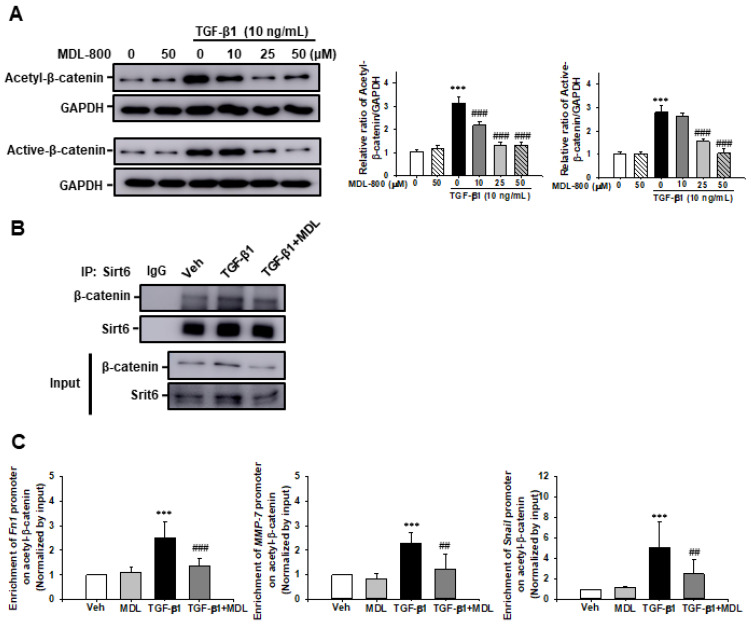Figure 9.
Effect of MDL-800 on TGF-β1-induced β-catenin acetylation and β-catenin target gene promoter enrichment at the site of β-catenin acetylation in HK2 cells. (A) Representative Western blot for acetyl-β-catenin and active-β-catenin from HK-2 cells treated with Veh or TGF-β1 (10 ng/mL), with or without MDL-800 at indicated doses (10, 25, or 50 μM). Treatment with TGF-β1 (10 ng/mL) over 24 h increased the expression of acetyl-β-catenin and active-β-catenin. The expression of acetyl-β-catenin and active-β-catenin decreased in a dose-dependent manner after the administration of MDL-800 treatment. The bar graph shows the densitometric quantification presented as the relative ratio of each protein to GAPDH. Data are presented as mean ± SD. (B) Representative Western blot analysis of β-catenin and Sirt6 from HK-2 cells after Veh or TGF-β1 (10 ng/mL), with or without MDL-800 (50 μM). HK-2 cell lysates were immunoprecipitated against the Sirt6 antibody, and immunoprecipitants were immunoblotted with β-catenin. (C) Chromatin immunoprecipitation (ChIP) assay of β-catenin target genes, such as Fn1, MMP7, and Snail promoter regions in HK2 cells, after 24 h treatment of vehicle (Veh), TGF-β1 (10 ng/mL) with or without MDL-800 (50 μM). Immunoprecipitation was performed using acetyl- β-catenin antibody. Normal mouse IgG was used as a negative control and the PCR product of input chromatin (input 5%) before immunoprecipitation was used as a positive control. Quantitative real-time PCR was performed using specific primers for Fn1, MMP7, and Snail promoter regions. All results were normalized to input levels. Data are expressed as mean ± SD from four independent experiments. ***, p < 0.001 versus Veh or MDL; ###, p < 0.001 versus TGF-β1 (10 ng/mL); ##, p < 0.01 versus TGF-β1 (10 ng/mL). Veh, vehicle; MDL, MDL-800; TGF-β1, transforming growth factor-β1; α-SMA, α-smooth muscle actin; CTGF, connective tissue growth factor; Fn1, fibronectin; MMP-7, matrix metalloproteinase-7.

